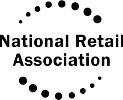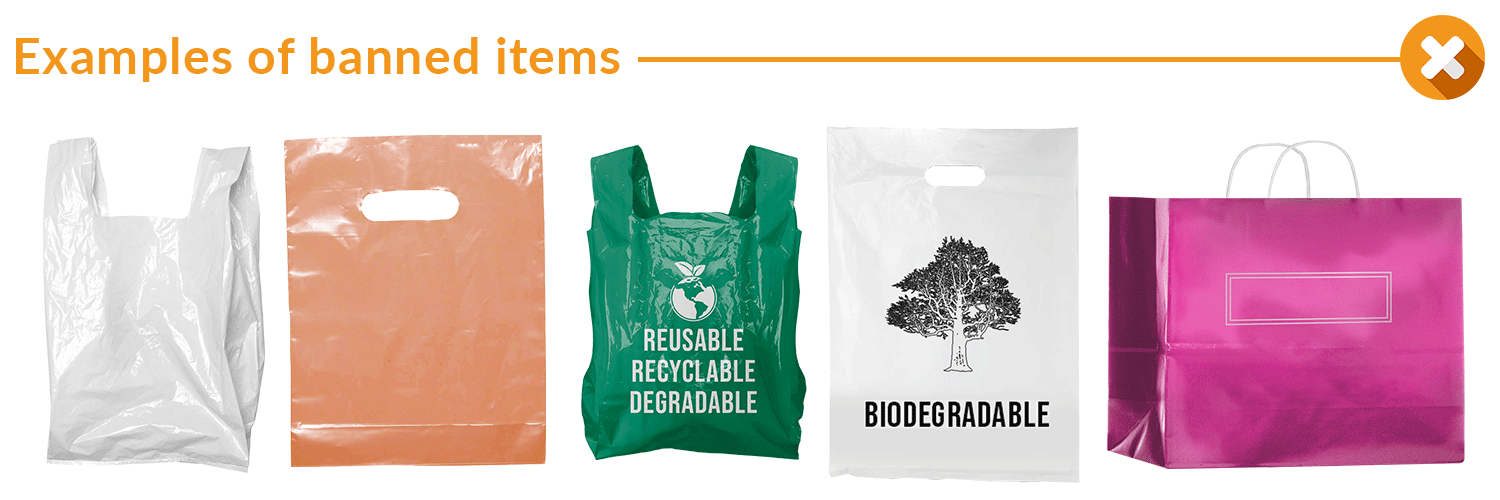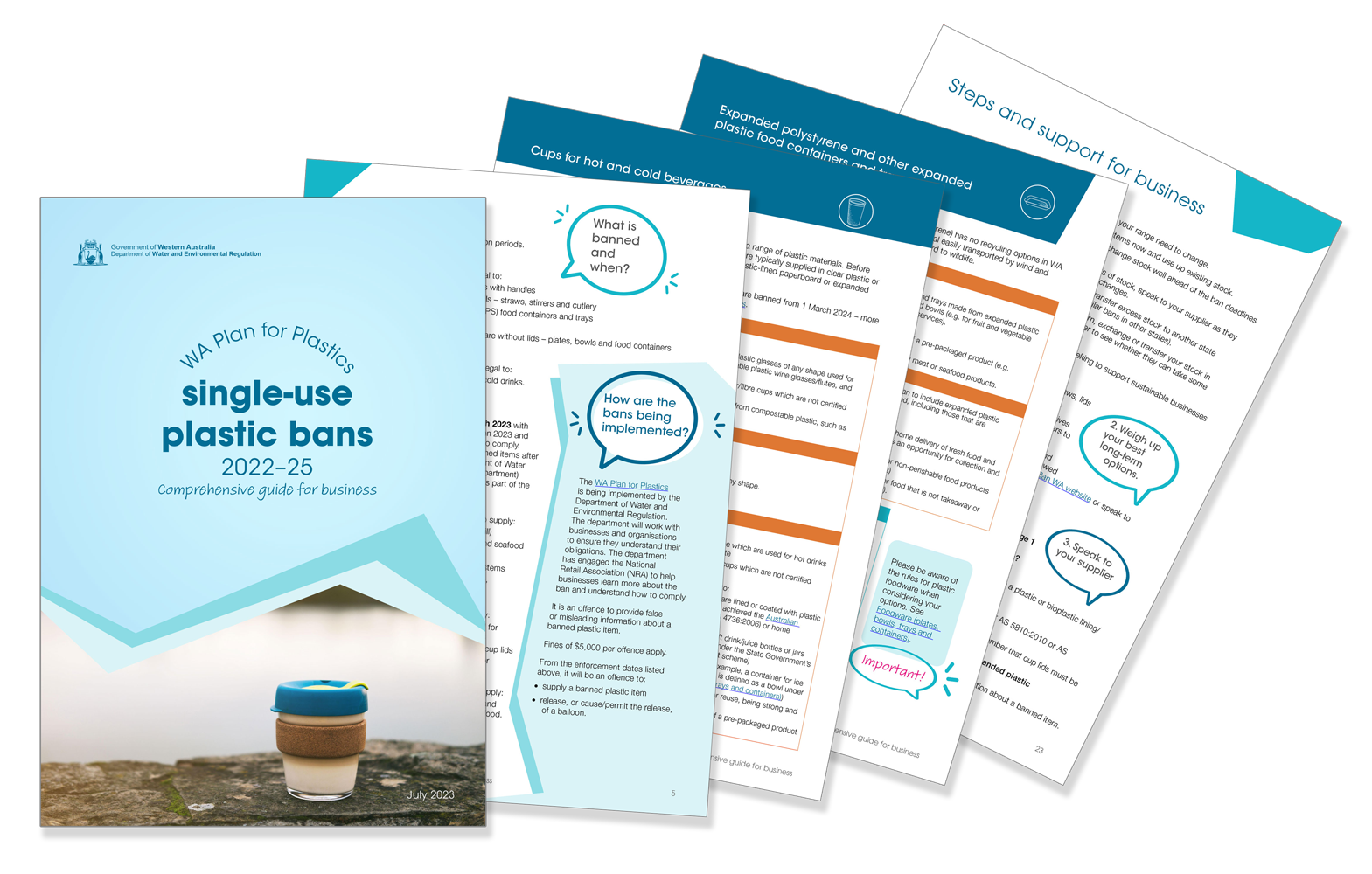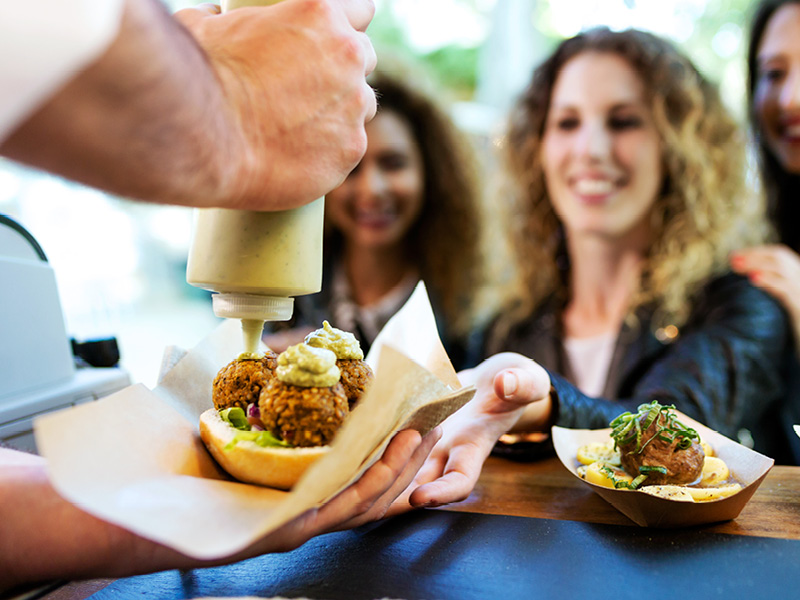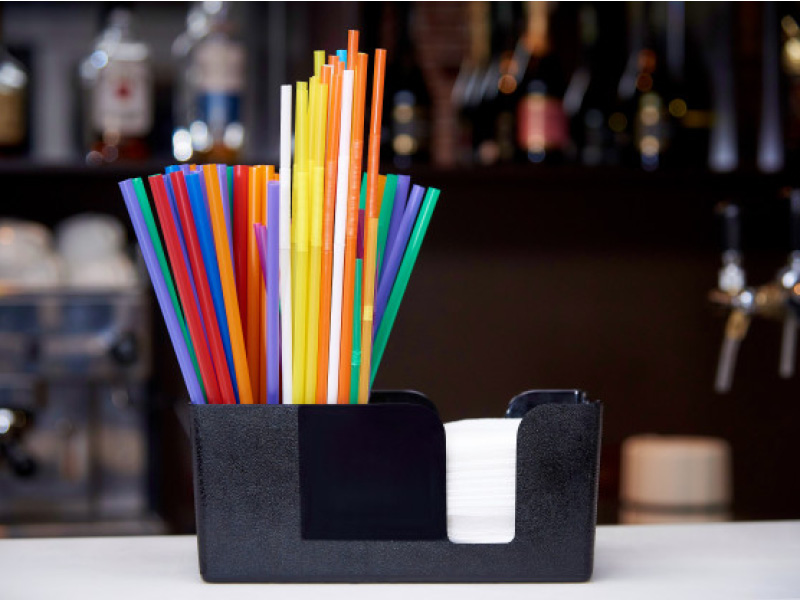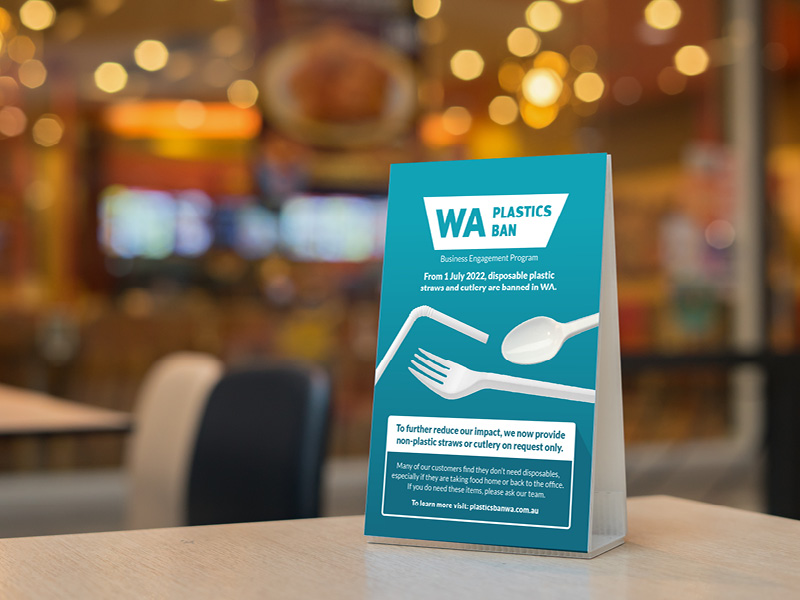Banned Items & Alternatives
Understanding banned items
Businesses should first assess which items in their range need to change. Read the resources available, come to an online information session or contact the National Retail Association if you are unsure.
When weighing up your options, consider if you really need to keep supplying the items and then consider reusable alternatives. If you need disposable alternatives, ensure you understand specific criteria and speak to your existing suppliers about compliant options.
Exemptions: please note that additional exemptions and amendments to the regulations can occur.
Check the Updates section for recent announcements. Read more>
STAGE 1
The Stage 1 bans commenced 1 January 2022 with two enforcement dates in July and October 2022.
Banned from 1 January 2022:
- providing false or misleading information about Stage 1 banned items.
Banned from 1 July 2022:
- all plastic shopping bags with handles
- disposable plastic utensils - straws, stirrers and cutlery
- disposable plastic foodware without lids - plates, bowls and food containers
- expanded polystyrene food containers and trays
- balloon releases are also banned from 1 July 2022; however, balloons are not banned.
Banned from 1 October 2022:
- disposable plastic cups for cold drinks
STAGE 2
The Stage 2 bans started on 1 March 2023 with staggered enforcement dates between 2023 and 2025 to provide time for businesses to comply.
Banned from 1 March 2023:
- providing false or misleading information about Stage 2 banned items.
From 1 September 2023:
- loose-fill expanded plastic packaging
- EPS cups and EPS trays for raw meat and seafood
- degradable plastics
- disposable cotton buds with plastic stems
- microbeads in rinse-off personal care, cosmetic and cleaning products
From 1 March 2024:
- disposable plastic coffee cups
- disposable plastic cup lids (for hot or cold drinks)
- disposable plastic trays for takeaway or eat-in food
From 1 September 2024:
- disposable plastic produce bags used for fresh unpackaged fruit and vegetables
- disposable plastic lids for bowls, trays and containers used for takeaway or eat-in food
- disposable plastic lidded bowls, trays and containers used for takeaway or eat-in food
From 1 July 2025:
- moulded or cut expanded plastic packaging
The ban applies to:
- conventional plastics made from fossil fuels, as well as plant-based plastics (limited exemptions apply)
- items made of plastic in whole or part (including linings, coatings, and laminates)
- items sold or given away
- items supplied individually or in packets
The ban does not apply to:
- food or drink products pre-packaged offsite (except EPS)
- lids applied to pre-packed foodware where the food is prepared in advance and displayed for selection by customer
- items in food or beverage products or enclosed or attached items (e.g. straw attached to juice box)
- items intended for supply outside WA or business-to-business transport
- plastic‑lined paperboard items certified to Australian composting standards (for certain items only)
- plastic straws provided in certain situations for people with a disability or healthcare need
- items used to provide service in aircraft
.
Click on the buttons below to navigate to an item on this page.
BAGS
SHOPPING BAGS
IMPORTANT: The 2022 ban replaces the previous ban on lightweight plastic shopping bags.
BANNED FROM 1 JULY 2022
The ban now applies to all plastic shopping bags with handles which are used to convey goods from a business, including those used for home delivery or online sales.
This includes:
- shopping bags made from plastic film of any thickness
- shopping bags made from plastic or bioplastic film
- paper shopping bags with handles which are plastic laminated
The ban does not apply to:
- plastic bags without handles
- produce or barrier bags (see September 2024 produce bag ban)
- sealed packaging (e.g. bread bags)
- other bags not intended for conveying goods from a retailer (e.g. bags for waste, nappies or dog waste)
ALTERNATIVES
First, consider if you need to supply a bag. You could encourage customers to bring their own, reuse stock boxes or provide trolleys.
Then, consider using reusable bags made from fabrics such as cotton, jute, hessian, bamboo or hemp.
You can also use synthetic fabrics such as nylon, recycled PET, or polypropylene*.
*Non-woven polypropylene bags (like the green bag pictured) must have stitched seams and a minimum weight of 90 gsm.
Any shopping bag with handles made from plastic or compostable plastic film is banned, regardless of reusability.
Finally, if you need a disposable option, you can use paper bags, but these must not have a plastic or cello laminate.
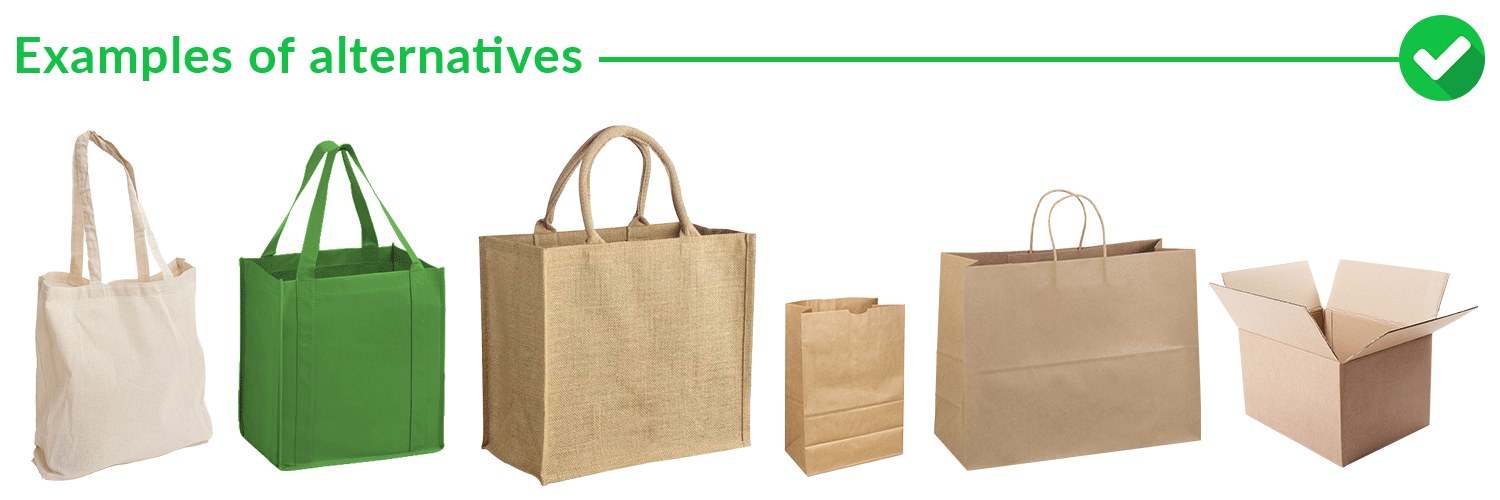
PRODUCE BAGS
Each year Western Australians use more than 115 million produce bags. Most end up in landfill but many are littered in the environment, harming our wildlife. There are currently no widespread recycling options for produce bags in WA and the bags contaminate other recycling streams.
IMPORTANT: The rules and timing for produce bag phase-out have been updated. Please see below.
BANNED FROM 1 SEPTEMBER 2024
The ban applies to:
- the sale or supply of plastic produce bags for loose fresh fruit and vegetables.
The ban does not apply to:
- produce bags used for anything other than loose fresh fruit and vegetables (e.g. raw meat, bakery products, preserved fruit, deli items)
- reusable produce bags made from plastic fabric such as polyester or nylon
- pre‑packaged fruit and vegetables (e.g. grape and banana bags)
- bulk bags sold on‑shelf (e.g. freezer bags, sandwich bags, zip-lock bags)
- produce bags which have achieved an Australian composting standard.

UPDATE
The WA Government is proposing further changes to produce and barrier bag regulations which would come into effect September 2024 and July 2025. Businesses are welcome to provide feedback and input.
Consultation closes Friday 31 May 4pm WST.
ALTERNATIVES
First, encourage customers to place loose produce directly into their baskets and trolleys, then straight onto the scales. This practice avoids produce bags altogether and is becoming more common. Customers can also be encouraged to bring their own reusable bags.
Then, consider whether you could offer loose produce or bulk produce in shop-owned caddies for weighing. Loose produce could then be transferred to the customer’s own reusable bags at the point of sale.
Finally, if you need disposable alternatives, you can supply paper bags or boxes.
Plastic produce bags which have achieved an Australian composting standard are allowed.
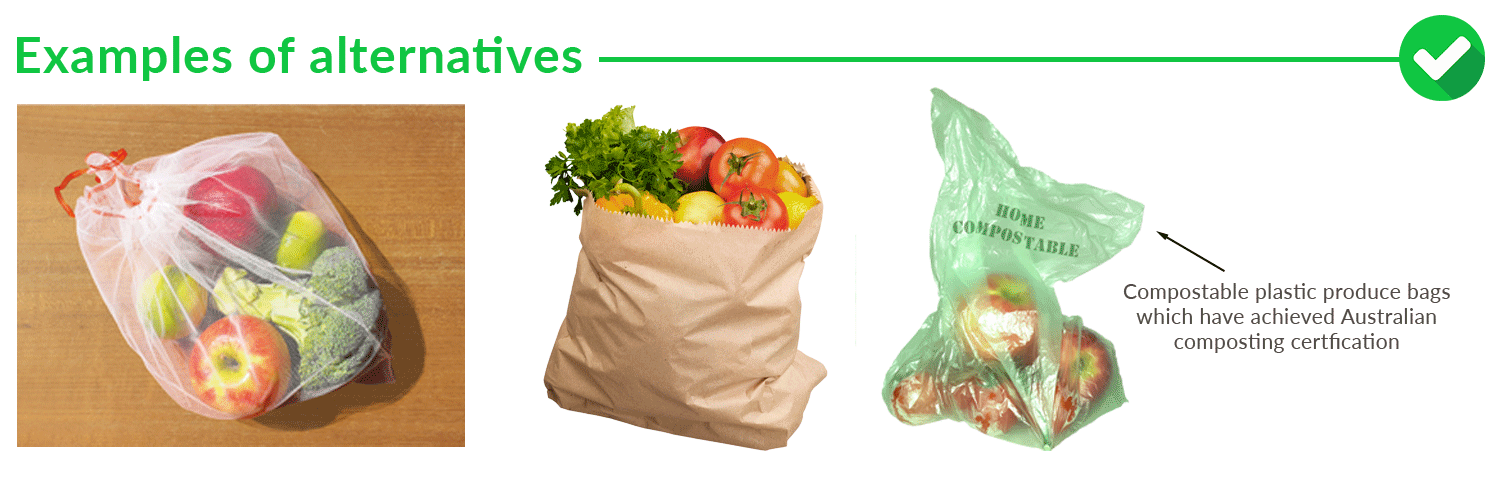
TIPS ON HOW TO COMPLY
When dealing with customer’s own produce bags at a point-of-sale, you need to ensure the bag weight is removed.
To do this, you can:
- Remove fruit or veg from customers’ bags to place them onto the weighing station
- Tare for multiple common alternatives, such as paper bags, and reusable fabric or mesh bags. Businesses can pre-program their point of sale for multiple bag weights that employees or customers can select from.
- Provide in-store reusable caddies or buckets for customers to gather and bring produce to the till where the known weight of this caddy or bucket can be removed.
It is recommended you communicate changes to your customers before the ban starts by putting up signage about the upcoming change. Ask customers to be patient and to help to reduce single-use plastic use by bringing their own bags, using reusable bags or caddies in store or whatever alternative path your business chooses.
IMPORTANT
The Western Australian Government is reviewing whether barrier bags beyond those used for fresh fruit and vegetables should be phased out, and whether a design standard for all produce/barrier bags is needed.
Businesses are strongly encouraged to register for updates here. The National Retail Association will also relay any changes or consultation opportunities via the online information sessions.
UPDATE
The WA Government is proposing further changes to produce and barrier bag regulations which would come into effect September 2024 and July 2025. Businesses are welcome to provide feedback and input.
Consultation closes Friday 31 May 4pm WST.
UTENSILS
STRAWS
BANNED FROM 1 JULY 2022
The ban applies to:
- disposable plastic straws
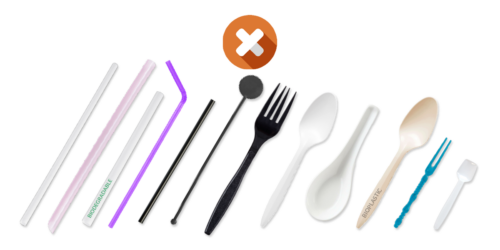
The ban does not apply to:
- items which arrive to store in pre-packaged food and beverage products (eg. straw attached to juice box).
ALTERNATIVES
First, consider whether you need to provide straws, stirrers or cutlery, especially if many of your customers consume your products at home or the office.
Then, consider reusable utensils such as metal, bamboo, silicone or glass. You could also encourage customers to bring their own reusable utensils which are available in handy kits.
Finally, if you do need disposable alternatives, consider uncoated paper, bagasse, wood, wheat or bamboo.
Important:
Utensils which contain any form of ‘plant-based’ or compostable plastic are not allowed (regardless of certification). In particular, most sugarcane straws and cornstarch cutlery contain bioplastics and are therefore banned.
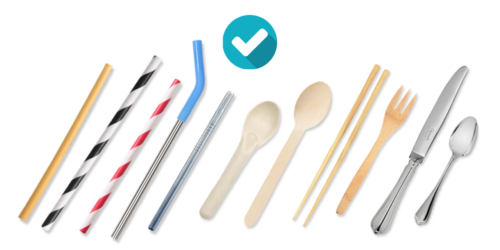
Exemption for straws
Businesses can supply disposable plastic straws in certain situations to ensure access for people with a disability or medical need.
- Businesses can keep plastic straws out of view and supply a single plastic straw only if a customer requests one as part of food or drink supply. You do not need to ask for a reason and you are not obliged to provide a plastic straw.
- Packs of plastic straws can be supplied by authorised organisations and care facilities (see list).
- Manufacturers can supply plastic straws to clients if they have reasonable grounds to believe they are for the above purposes only.
- Exempted uses of straws, which include supply in a care facility, by a medical care provider or in connection with an aircraft. Further information can be found at plasticsbanwa.com or in the Stage 1 Factsheet – Plastic Straws.
CUTLERY
BANNED FROM 1 JULY 2022
The ban applies to:
- disposable plastic stirrers and swizzle sticks
- disposable plastic forks, spoons, knives, sporks, splayds, chopsticks and food picks.

The ban does not apply to:
- utensils used for food preparation or servingware (eg. tongs, cake servers)
- items which arrive to store in pre-packaged food and beverage products (eg. fork in pre-packaged and sealed salad).
- Exempted uses, such as food service on an aircraft.
ALTERNATIVES
First, consider whether you need to provide straws, stirrers or cutlery, especially if many of your customers consume your products at home or the office.
Then, consider reusable utensils such as metal, bamboo, silicone or glass. You could also encourage customers to bring their own reusable utensils which are available in handy kits.
Finally, if you do need disposable alternatives, consider uncoated paper, bagasse, wood, wheat or bamboo.

Important:
Utensils which contain any form of ‘plant-based’ or compostable plastic are not allowed (regardless of certification). In particular, most sugarcane straws and cornstarch cutlery contain bioplastics and are therefore banned.
CUPS
DID YOU KNOW?
Most paper cups have a plastic or bioplastic lining or coating to make them waterproof.
Single use cups for hot and cold beverages can be made from a range of plastic materials. Before the 1 October 2022 ban on cold beverage cups, these cups were typically supplied in clear plastic or clear bioplastic cups. Hot beverages are typically supplied in plastic-lined paperboard or expanded polystyrene cups.
IMPORTANT: Lids include rigid or flexible lids, including heat-sealed film applied to the top of a cup.
Plastic lids for containers and bowls are also banned in September 2024 – more information is provided under Foodware.
CUPS
BANNED FROM 1 OCTOBER 2022
The ban applies to:
- disposable plastic cups or plastic glasses of any shape used for cold drinks
- disposable plastic-lined paper/fibre cups which are not certified compostable (see below)
- disposable cups made purely from compostable plastic, such as PLA
BANNED FROM 1 SEPTEMBER 2023
The ban applies to expanded polystyrene (EPS) cups of any shape.
BANNED FROM 1 MARCH 2024
The ban applies to:
- disposable plastic cups of any shape which are used for hot drinks such as tea, coffee and hot chocolate
- disposable plastic-lined paper/fibre cups which are not certified compostable (see below)
The bans on disposable plastic cups do NOT apply to:
- disposable paper or fibre cups which are lined or coated with plastic or bioplastic where the whole cup has achieved the Australian Standard for industrial composting (AS 4736:2006) or home composting (AS 5810:2010)
- plastic beverage containers such as soft drink/juice bottles or jars (however, these may have obligations under the State Government’s Containers for Change container deposit scheme)
- containers which are used for food (for example, a container for ice cream or soup may be called a ‘cup’ but is defined as a bowl under this ban - see rules for foodware)
- reusable plastic cups that are designed for reuse, being strong and sturdy
- expanded polystyrene cups that are part of a pre-packaged product such as a noodle pack.
ALTERNATIVES
First, consider whether customers could be encouraged to bring their own cups. Alternatively, contact Plastic Free Places for further information on joining a cup exchange scheme or start a cup return scheme for your customers.
Then, consider reusable options such as ceramic or metal. If most customers drink onsite, you could save money and waste by using washable items.
Finally, if you do need disposable alternatives, look for lined/coated paper or fibre cups that have achieved the Australian Standard for industrial (AS 4736:2006) or home (AS 5810:2010) composting.
Cups purely made from compostable plastic are not allowed.
Did you know? Most paper or fibre-based cups have a plastic or bioplastic lining or coating to make them waterproof.
- When looking to source compliant cups for hot and cold beverages, make sure you engage with your supplier to understand what lining or coating has been applied to the inside of the cup to ensure it is complaint with the regulations.
- A lined or coated paper cup is compliant if it is certified to an Australian Standard for industrial (AS 4736:2006) or home (AS 5810:2010) composting. Without these certifications don’t believe claims or labels. More information about composting certification here.
- Items made purely from bioplastic (such as clear cups made from polylactic acid [PLA]) are not allowed, even if they are certified. This is because bioplastics are plastic and behave the same way as regular plastics in the environment. Bioplastics are not readily separated from other plastics such as PET so they contaminate recycling processes.
Make sure you have used your non-compliant stock and transitioned to compliant stock before the ban starts, as you cannot supply banned cups after enforcement dates even if you purchased it prior to 1 March 2024.
CUP LIDS
IMPORTANT: Lids include rigid or flexible lids, including heat-sealed film applied to the top of a cup.
BANNED FROM 1 MARCH 2024
The ban applies to:
- disposable plastic cup lids for all hot and cold cups
- paperboard/fibre cup lids which have a plastic or bioplastic lining
- bioplastic lids made purely from bioplastic
- certified compostable plastic lids
- heat-sealed films made of plastic or bioplastic
The ban does NOT apply to:
- paperboard/fibre lids without a lining
- reusable plastic cup lids that are designed for washing and reuse (eg. as part of a ‘keep’ cup).
ALTERNATIVES
First, encourage customers to bring their own lidded cups or go without a disposable lid. Better yet, contact Plastic Free Places for further information on joining a cup exchange scheme or start a cup return scheme for your customers.
Then, consider reusable options such as ceramic or metal. If most customers drink onsite, you could save money and waste by using washable items.
Finally, if you do need disposable cup lids, they must be entirely made of paperboard or fibre (without a plastic or bioplastic lining or coating). Acceptable materials include uncoated paperboard and sugarcane pulp (also known as bagasse).
Did you know? Plastic-lined paperboard looks very similar to unlined lids.
- Tell your supplier that you are looking for a lid that is all paperboard/fibre, unlined and plastic free.
- You may need to remind them that certified compostable plastic lids are not allowed.
- Ensure that your cup lid is a safe fit to your compliant cup stock.
FOODWARE
Each year Western Australians use more than 130 million lids for disposable plastic containers, bowls, plates and trays used for takeaway or eat-in food. These foodware items are commonly littered and are not readily recyclable, contaminating recycling systems.
Whilst the Stage 1 ban focussed on unlidded foodware, the Stage 2 ban captures lidded foodware when used for takeaway and eat-in food. The ban will apply differently according to the circumstances of the product supply.
- Stage 1 banned disposable unlidded plates, bowls, expanded plastic (such as EPS) trays and containers in July 2023.
- Stage 2 adds disposable unlidded plastic trays used for takeaway or eat-in food, with enforcement commencing 1 March 2024.
- Stage 2 will also ban disposable plastic containers, bowls, plates and trays when supplied with a lid, with enforcement commencing 1 September 2024.

PLATES, BOWLS, TRAYS, CONTAINERS & LIDS
BANNED FROM 1 JULY 2022
The 1 July 2022 ban applies to:
- disposable plastic unlidded plates, bowls or containers (‘foodware’)
- packs of unlidded disposable plastic foodware
- includes those made wholly from plastic or bioplastic
The 1 July 2022 ban does not apply to:
- disposable plastic trays for raw meat or seafood
- unlidded bowls, trays and food containers made from paper/fibre which have a plastic or bioplastic lining, where the whole product is certified compostable to AS standards. Please note that paper plates must be plastic-free.
- bowls, trays or food containers which have a lid when served until 1 September 2024, when lidded foodware is banned
- food or drink items which have been pre-packaged offsite (e.g., tray for a frozen meal)
- plastic foodware designed for reuse
- large serving ware, catering platters and their lids (e.g. large platters)
BANNED FROM 1 MARCH 2024
The 1 March 2024 ban applies to:
- disposable plastic unlidded food trays, such as sushi trays and bento boxes
The 1 March 2024 ban does not apply to:
- compostable lined paperboard trays certified to Australian Standards for industrial (AS 4736:2006) or home (AS 5810:2010) composting
- trays which have a lid when served until 1 September 2024, when lidded foodware is banned
- plastic trays designed for reuse
- food or drink items which have been pre-packaged offsite (e.g., tray for a frozen meal)
BANNED FROM 1 SEPTEMBER 2024
The 1 September 2024 ban applies to:
- plastic lids (including rigid or flexible lids, heat-sealed films or windows) for bowls, trays or containers that are used for takeaway or eat in food and are not pre-packed
- lidded plastic bowls, trays or containers that are used for takeaway or eat in food which were previously exempt because they were served with a lid
- packs of lidded disposable plastic foodware
The 1 September 2024 ban does not apply to:
- lids or lidded foodware primarily made from paper or fibre with a plastic or bioplastic coating where the whole item is certified to Australian composting standards;
- food that has been pre-packaged offsite (see FAQ 2 below);
- plastic lids and windows for pre‑packed takeaway food placed on display (see FAQ 2 below)
- plastic lids on foodware that contains food that is not eat in or takeaway. ;
- reusable container lids designed for washing and ongoing use;
- foodware that contains foodstuffs that are not considered to be eat in or takeaway food (see FAQ 3 below)
UPDATE 17 July 2024: New class exemptions published for soupy/liquid food and mine sites.
See Updates>
Is my item a bowl, food container or cup?
- If it contains food and is round - it’s a bowl and was banned 1 July 2022. BUT if it has a lid and is supplied with takeaway/dine in food, then the whole item (base and lid) is not banned until 1 September 2024.
- If it contains food and is NOT round - it’s a food container and banned 1 July 2022. BUT if it has a lid and is supplied with takeaway/dine in food, then the whole item (base and lid) is not banned until 1 September 2024.
- Food: e.g. ice cream, chicken, mousse, chips, soup.
- If it contains a beverage - it’s a cup. For more information view the section on cups.
What is takeaway or eat-in food?
Eat-in food means food that is intended to be eaten at the premises at which it is supplied, including restaurants, food courts, markets or anywhere food is typically consumed on the premises.
Takeaway food means food in which the whole item is typically consumed soon after purchase without any further preparation, ingredients, or components.
For example, items that are NOT likely to be considered takeaway food (and therefore not likely to be included in the ban) include:
- Foodstuffs which are typically used as an ingredient or component of another dish (eg. olives, cheese, salami, sauce, dip, plain bread roll) unless this is part of a takeaway/eat-in meal offering (e.g sauce provided with chips, the sauce container would be in scope of the ban)
- Food that needs further preparation, cooling or heating before being consumed (eg. cold meat pie).
- Food which is not typically consumed whole or in one setting (eg. multi-serve tub of yoghurt, bulk pack of cookies or bread rolls, bulk pack of fruit pieces, large cake).
IMPORTANT
- Foodware made from paper must be uncoated, plastic-free or have achieved Australian composting certification if it has a plastic lining or coating. (Note there is a transitional exemption for EU certified paperboard which has commenced AU certification for home composting - read more>)
- Items made wholly from bioplastic are not allowed (even if they are certified).
What rules apply to pre-packaged or pre-packed takeaway food?
Pre-packaged product means a product that — (a) arrives at the premises from which it is to be supplied to a consumer in a container or packaging in or by which the product is wholly enclosed, whether or not it is also in an outer container or packaging that contains multiple units of the product; and (b) is not designed to be removed from its container or packaging, other than any outer container or packaging, before it is supplied to the consumer.
For example, a pre-packaged product is something made and packaged offsite and not modified prior to sale to the customer, such as a sandwich or salad made and packaged at a bulk food manufacturer and then delivered to multiple stores to be placed on shelf. If the food is a pre-packaged product, then the ban does not apply and both the base and lid of the foodware can remain plastic. Please consider the most appropriate packaging for your circumstances and avoid using plastic where possible.
Pre-packed takeaway food — (a) means takeaway food that is prepared in advance and placed into foodware before being put on display for selection by a consumer; but (b) does not include takeaway food that is prepared, or placed into foodware following an order or request by a consumer.
For example, pre-packed takeaway food is a sandwich, salad or yoghurt made on the premises, packed ahead of time, and placed on display for customers to purchase later (eg. grab & go service). If this is the case, the foodware base must comply with the ban, but the lid or window can remain plastic if desired. This ensures pre-packed takeaway food can remain visible with a transparent plastic lid or window so customers can select it from display.
What about containers for sauces or dips?
If you sell sauces, dips or dressings as a bulk product on-shelf and it's unlikely to be consumed with a takeaway or eat-in product you sell (like a squeezy bottle of tomato sauce or a tub of dip intended for a cheese platter), then it is unlikely to be considered a takeaway/eat-in food container.
However, if a sauce, dip or dressing is provided as part of a takeaway or eat-in meal (such as a little tub of dressing to mix into your salad, a tub of tartare sauce, or a dessert dipping sauce in a takeaway meal) it is likely to be included in the ban as a food container. Please follow the guidance provided for takeaway/eat-in food containers.
Note that the pre-packaged and pre-packed guidance applies so:
- A sauce container that arrives at your store already pre-packaged, it is not in scope of the ban.
- If you pre-pack your sauce ahead of time and then later provide it with takeaway or eat-in food, the base must comply with the ban, but the lid is exempt.
- If you pack your sauce when a customer orders their food, then the base and lid would need to comply.
First, consider if customers could bring their own foodware.
Then, consider reusable options such as ceramic, metal, bamboo, glass or thick reusable plastic. If most of your customers dine in-store you could save money and waste by using washable items.
Finally, if you do need disposable alternatives, consider uncoated paper, bamboo, wood or sugarcane pulp.
IMPORTANT
- Foodware made from paper must be uncoated, plastic-free or have achieved Australian composting certification if it has a plastic lining or coating. (Note there is a transitional exemption for EU certified paperboard which has commenced AU certification for home composting - read more>)
- Items made wholly from bioplastic are not allowed (even if they are certified).
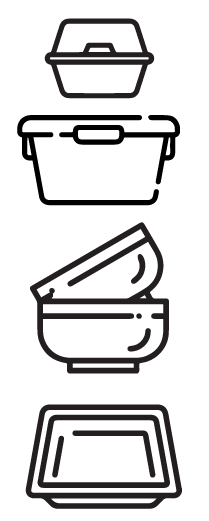
EXPANDED PLASTIC
Expanded plastics (commonly referred to as plastic foam) are a lightweight material easily transported by wind and water when littered. It breaks into smaller pieces in the environment, which poses a hazard to wildlife. Expanded plastic cannot be recycled in kerbside recycling systems and very little is recycled in commercial or industrial systems.
This ban applies to all forms of expanded and foamed plastics, such as expanded polystyrene (EPS), expanded polyethylene (EPE), expanded polypropylene (EPP), EVA and expanded bioplastics.
The ban aligns with direction of the Australian EPS Roadmap, although also captures other expanded plastics and extends responsibility beyond brand owners. The ban applies to all Western Australian businesses, manufacturers, retailers, and distributors that sell or supply goods that contain this packaging.
EXPANDED PLASTIC FOODWARE & TRAYS
BANNED FROM 1 JULY 2022
The ban applies to:
- disposable food containers and trays made from expanded plastic such as clamshells, plates and bowls. For example, for fruit and vegetable packaging, or takeaway meal services.
The ban does not apply to:
- EPS containers that are part of a pre-packaged non-perishable food product (e.g. on-shelf noodle cups)
- EPS trays used to package raw meat or seafood products
BANNED FROM 1 SEPTEMBER 2023
This ban builds on the July 2022 ban to include expanded plastic trays used for raw meat and seafood, including those that are pre-packaged.
The ban does not apply to:
- expanded plastic/foam boxes for home delivery of fresh food and pre‑prepared meals where there is an opportunity for collection and reuse
- expanded plastic pre-packaging for non-perishable food products (e.g., expanded plastic noodle cups)
- non-expanded plastic trays can continue to be used for food that is not takeaway or eat-in food (such as raw meat, seafood)
Firstly, consider if customers could bring their own takeaway food containers or if you could reintroduce reusable options such as ceramic, metal, bamboo, or glass containers.
Then, if you require single-use items, consider uncoated paper, bamboo, aluminium, or sugarcane pulp. For raw meat and seafood consider butcher’s paper.
Finally, consider lined paperboard or pulp products with Australian Standard composting certification. For foods which are not takeaway or eat-in food, such as raw meat and seafood, you can continue to use plastic trays (consider readily recyclable plastics such PET) if required.
Important: Please be aware of the rules for plastic foodware when considering your options.
EXPANDED PLASTIC PACKAGING
The following bans on expanded plastic packaging will be enforceable in two stages.
Loose-fill packaging made from expanded plastic
BANNED FROM 1 SEPTEMBER 2023
The ban applies to loose‑fill EPS or other foamed plastic packaging material such as packing peanuts, packing beads, and S shaped beads.
The ban does NOT apply to:
- flexible plastic wraps and sleeves made from expanded plastic
- fresh produce boxes and bulk cold home-delivered meal services
- packaging retained by a business after that installation of consumer goods by a licensed installer (eg. airconditioner packaging)
- specialist packaging for medical or scientific applications, for example, organ transport or pharmaceuticals.
Moulded packaging made from expanded plastic
BANNED FROM 1 JULY 2025
The ban applies to moulded or cut packaging made from any form of expanded plastic.
This includes, but is not limited to EPS, EPE, EPP and ethylene-vinyl acetate (EVA). Only packaged products with a manufacturing date of 1 March 2025 or later will need to comply.
Note: The date of manufacture deadline has been extended to support regulatory transition. Products manufactured or supplied after 1 March 2025 will be required to comply with the 1 July 2025 ban commencement unless they are exempt through other means as detailed below.
The ban does NOT apply to:
- flexible plastic wraps and sleeves made from expanded plastic
- packaging for products weighing more than 45 kg (excluding the packaging)
- packaging which has been identified by the manufacturer as being fragile and requiring protective packaging that complies with a standard (see more information below)
- fresh produce boxes and bulk cold home-delivered meal services where there is an opportunity for the business to collect and reuse.
- packaging retained by a business after that installation of consumer goods by a professional installer
- packaging for products where the packaging is a permanent part of the product’s carry case or kit
- specialist packaging for medical or scientific applications, for example, organ transport or pharmaceuticals
- expanded plastic which forms part of the product (eg. bean bag fill, surfboards)
- moulded expanded plastic packaging used to repackage repaired goods supplied before the enforcement date
- packaging for the building and construction industry
- packaged products manufactured before 1 March 2025
- packaging sent between businesses (see government factsheet for B2B definition)
Expanded plastic packaging may be used to protect items that have been identified by the manufacturer as being fragile and requiring protective packaging that complies with a standard specified by the manufacturer.
The manufacturer does not need to seek an exemption to operate under this provision. If expanded plastic is used, the Department of Water and Environmental Regulation would expect the manufacturer to be able to provide documentation that demonstrates:
- A decision has been made that the product could be functionally damaged in transit and/or present a safety risk without protective packaging;
- The standard of protection that is required (such as Australian Standard transport tests (drop tests, vibration tests or rough handling tests), International Safe Transit Association (ISTA) tests for packaged products, or international standard packaging performance tests).
If at least two compliant packaging alternatives (e.g. moulded cardboard, hybrid card and air pillow wrap) fail to provide the standard of protection (determined above), this would be sufficient evidence that expanded plastic packaging is required.
In addition, there are some product types which are identified as fragile due to the nature of their weight and precision equipment. These are listed in the Government Factsheet >
Note: When testing alternative packaging, consider the alternative designs and materials that can be introduced in existing manufacturing processes and transport logistics. For some items, viability of alternative packaging may require further innovation, research and volume prior to becoming comparable to existing process efficiency in an automated factory. Please contact the department to discuss your processes and arrangements.
Where expanded plastic is deemed necessary for the packaging of a product, retailers, suppliers and distributors are encouraged to seek written confirmation and relevant documentation from manufacturers. Retailers should seek and retain such documentation from 1 July 2025. In keeping with APCO’s product stewardship, evidence should also be available on request to identify a means of collection recovery for the consumer.
Fragility testing of alternatives is not intended to be duplicated or repeated for different models or like products. Like-for-like fragility evidence can be used where there is similarity between the design and construction of products. For example, testing for one type of appliance (e.g. a rangehood) would not need to be repeated for all model types. For further information, and information regarding potential exemptions, please contact the department.
From 1 July 2025, products supplied to a retailer (or organisation for supply) with a manufacturer's date dating back to 1 March 2025 will need to comply.
Products manufactured prior to 1 March 2025 will not be impacted.
UPDATE:
On Tuesday, 28 May 2024, the WA Government published a class exemption allowing extra time for electronic products weighing between 25 kg and 45 kg, net weight, that require moulded expanded plastic packaging.
This class exemption notice will be active until 30 June 2026. It applies to manufacturers, suppliers, and purchasers of electronic products weighing between 25 kg and 45 kg, net weight, that require moulded expanded plastic packaging. The exemption covers the manufacturing date (initially before 1 July 2024) and the product sale date (initially banned from 1 July 2025) for these electronic products.
First, consider if your goods require protective packaging at all or if expanded plastic can be replaced with reusable protective packaging and wraps.
Then, consider if you can use paper or pulp based protective packaging, such as moulded pulp or cardboard, honeycombed paper, wool or straw. Soft plastic air pillows and bubble wrap are allowed but we recommend considering plastic-free options first.
Understand how the regulations apply to your products and business, including reviewing goods in your range that may not be your own brand.
Communicate with manufacturers and suppliers to ensure you are ordering products that contain compliant packaging which is free from expanded plastic.
UPDATE JUNE 2024: The WA Government has published an additional factsheet on expanded plastic packaging, available here >
OTHER ITEMS
Single use cups for hot and cold beverages can be made from a range of plastic materials. Before the 1 October 2022 ban on cold beverage cups, these cups were typically supplied in clear plastic or clear bioplastic cups. Hot beverages are typically supplied in plastic-lined paperboard or expanded polystyrene cups.
DEGRADABLE PLASTICS
Degradable plastics are plastics which contain additives that causes them to break up or fragment quickly under certain conditions. Although this feature was originally thought to address the plastic pollution problem, it has been demonstrated that the plastic fragments persist in the environment as microplastics, enter the food chain and never disappear. Degradable plastics also contaminate recyclable waste streams and some of the additives they contain can be toxic to the environment.
The labelling or promotion as degradable creates confusion and leads businesses and consumers to believe that they are making a more environmentally friendly choice, which is misleading. Certified compostable products generally do not have these additives and compost naturally over longer periods.
BANNED FROM 1 SEPTEMBER 2023
IMPORTANT: This is a ban on a type of material and is not specific to any particular plastic item. It applies to all products, packaging, and other uses.
The ban applies to all degradable plastics including:
- oxo-degradable
- photo-degradable
- landfill degradable
- any other plastic material designed to fragment more quickly
Degradable plastics may not be clearly labelled, and many degradable plastics are labelled or promoted using the above terms. Some are promoted as ‘biodegradable’ but fail to provide any composting certification or evidence of the mechanism by which the product breaks down rather than breaking up into pieces as a degradable plastic would.
Whilst composting certification is not compulsory for biodegradable plastic, the manufacturer must be able to provide evidence that demonstrates the plastic is able to be broken down by microorganisms into carbon dioxide, water, biomass and a mineral residue, and does not contain an additive designed to accelerate fragmentation of the plastic.
Degradable plastics are commonly found in soft plastics. Some common examples are:
- dog waste bags
- dry-cleaning bags and garment bags
- magazine wraps
- bin liners
- agricultural soft plastic products
Soft plastic products that can be reused or recycled can be made without a fragmenting additive.
Alternatively, products can be manufactured using compostable bioplastics that meets an Australian Standard for industrial (AS 4736:2006) or home (AS 5810:2010) composting.
Firstly, consider whether the plastic can be avoided. Avoid supplying all unnecessary plastic to the customer.
Then, consider using or supplying AS-certified compostable bioplastics.
Finally, consider using or supplying soft plastics without additives designed to accelerate fragmentation.
Do you have a product that fragments after a few uses or are you unsure of a new product’s degradability?
Degradable plastic products may be difficult to identify. Start by following these steps:
- Check whether terms like ‘degradable’, ‘oxo-degradable’, ‘photo-degradable’, ‘landfill-degradable’ or ‘fragmenting’ are used to describe the product. If so, it is likely to contain degradable plastic.
- Look for the Australian Standard compostability certification logo. This indicates that the product is compostable and does not contain degradable plastic. If you are still unsure, contact the department’s plastics team for assistance.
- Ask the product distributor or manufacturer whether the plastic product contains an additive to accelerate its fragmentation under certain conditions.
If you are still unsure, contact the National Retail Association for assistance.
MICROBEADS
Plastic microbeads in rinse-off personal care, cosmetics and cleaning products enter the wastewater system, making their way into our oceans and waterways and are a risk to wildlife if ingested.
A voluntary agreement to phase out plastic microbeads in rinse-off personal care, cosmetics and cleaning products (known as BeadRecede) has been in place across Australia since 2017. A survey of relevant products in 2020 found 99.3 per cent were microbead free, but that most of the remaining products that still contain microbeads are used for personal care such as face scrubs.
BANNED FROM 1 SEPTEMBER 2023
The ban applies to rinse-off personal care cosmetics and cleaning products that contain microbeads, including:
- rinse-off products such as dyes, shampoo, conditioner, shaving cream, hairsprays, gels, creams, pastes, scrubs, exfoliants, masks and face, hand and body cleansers
- oral hygiene products including toothpaste, mouthwash and tooth whiteners
- cleaning products in indoor and outdoor commercial, industrial, and residential settings.
The ban does not apply to:
- wipe-off products such as sunscreen, moisturiser and make-up
- leave‑on personal care products such as moisturiser, deodorant, make‑up and lipstick
- printing applications such as toners and textile printing products
- craft glitter
- products required for industrial and medical applications (other than cleaning products)
Non‑plastic products with the same abrasive, exfoliant, filler and aesthetic function ‒ from materials like pumice and salt ‒ are available in more than 99 per cent of products.
Reusable exfoliant products such as brushes and loofahs can be used to replace rinse‑off exfoliants.
COTTON BUD STICKS
Cotton buds with plastic stems are a common single-use plastic item, that can cause problems for wildlife when littered into the environment. Many industries and manufacturers have been proactive in transitioning to plastic-free alternatives.
BANNED FROM 1 SEPTEMBER 2023
The ban applies to:
- cotton buds with plastic stems, including stems made with degradable plastic and bioplastic materials.
The ban does not apply to:
- cotton buds and swabs for professional medical, veterinary, scientific, forensic and law‑enforcement purposes
- cotton buds or swabs that make up part of a testing kit, such as rapid antigen tests
- applicators that are pre‑packaged as part of a set, such as in cosmetic kits
- reusable plastic cotton buds.
ALTERNATIVES
Single‑use cotton buds made with compostable stems (e.g. bamboo, cardboard or sugarcane) are widely available.
Reusable plastic cotton buds are a permitted alternative.
Single‑use cotton buds made with compostable stems (e.g. bamboo, cardboard or sugarcane) are widely available.
Reusable plastic cotton buds are a permitted alternative.
BALLOON RELEASES
BANNED FROM 1 JULY 2022
The ban applies to any person who releases a balloon inflated with gas that causes it to rise in the air.
This also includes:
- an adult responsible for a child who releases the balloon
- people, such as event organisers, which permit balloons to be released
The sale or supply of balloons is not banned or restricted.

The WA Government and National Retail Association have collaboratively created a Comprehensive Guide for Business. This one-stop resource covers ALL existing and upcoming bans in Western Australia.

